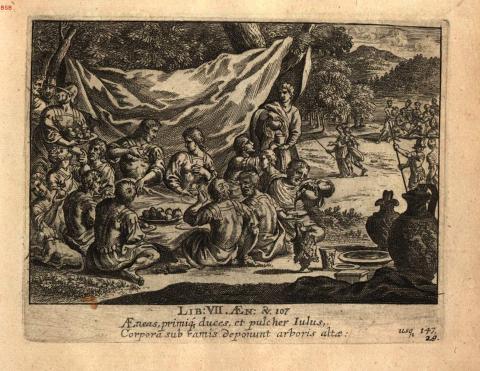Annotations
Aeneas and his men sit in a circle on the grass at an unfolded table-cloth on which a bowl of fruit stands.
Aeneas und seine Leute sitzen im Rund auf dem Rasen um ein ausgebreitetes Tafeltuch, auf dem eine Schale mit Früchten steht. (Suerbaum)
Engraving from a German children’s picture-book version of the Aeneid by G. J. Lang and G. C. Eimmart, “A tapestry of Roman virtues as seen in Vergil’s Aeneas and his brave deeds, rendered in sparkling engravings, as illustrations of the remarkable deeds of antiquity, for the common benefit of noble youth,” (Peplus virtutum Romanarum in Aenea Virgiliano eiusque rebus fortiter gestis, ad maiorem antiquitatis et rerum lucem, communi iuventutis sacratae bono, aere renitens) (Nuremburg: J.L. Buggel, 1688), pl. 29.


This engraving depicts an important scene from Book VII. Aeneas and his men sit down to a meal in Italy but are still so hungry at the end of it that they eat the bread they used as plates or tables. Iulus jokes that they are eating their very tables, “heus, etiam mensas consumimus?” (116). In so doing, he fulfills a prophecy that had been made to Aeneas by his father, which he recalls at lines 124 through 127, saying that the Trojans would not find peace until they were forced by hunger to eat their tables. (Lucy McInerney)